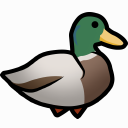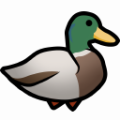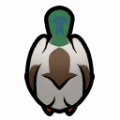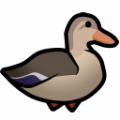Difference between revisions of "Duck"
m |
|||
| Line 1: | Line 1: | ||
| − | {{ | + | {{Stub|reason=Proper analysis, including comparison with non-chicken egg layers, needed.}} |
| + | {{Infobox main|animal | ||
| page verified for version = 1.3.3101 | | page verified for version = 1.3.3101 | ||
| name = Duck | | name = Duck | ||
| − | | image = | + | | image = DuckMale east.png |
| description = A very common type of farm bird, also appearing in the wild, the duck is raised for its delicious meat. It grows quick but lays eggs quite rarely. | | description = A very common type of farm bird, also appearing in the wild, the duck is raised for its delicious meat. It grows quick but lays eggs quite rarely. | ||
| type = Animal | | type = Animal | ||
| Line 48: | Line 49: | ||
A small, domesticated waterfowl, '''Ducks''' are not found in the wild, and can only be purchased from traders or received in self-taming events. Similar to Chickens, Ducks mature quickly and lay eggs often, making them both good meal birds and sources of [[Duck egg (unfert.)|eggs]]. Males of the species can be distinguished by their green heads and two-tone body while females have a solid colour head and body with darker wings. | A small, domesticated waterfowl, '''Ducks''' are not found in the wild, and can only be purchased from traders or received in self-taming events. Similar to Chickens, Ducks mature quickly and lay eggs often, making them both good meal birds and sources of [[Duck egg (unfert.)|eggs]]. Males of the species can be distinguished by their green heads and two-tone body while females have a solid colour head and body with darker wings. | ||
| − | ==Analysis== | + | == Analysis == |
As of version 1.3, Ducks are equivalent to [[chicken]]s as livestock in all but their hunger rate, where they require 20% more nutrition per day. Nearly all other attributes are equivalent, with the exception of Ducks having better damage output should they be involved in a melee. | As of version 1.3, Ducks are equivalent to [[chicken]]s as livestock in all but their hunger rate, where they require 20% more nutrition per day. Nearly all other attributes are equivalent, with the exception of Ducks having better damage output should they be involved in a melee. | ||
| − | ==Livestock== | + | == Livestock == |
{{Rewrite|reason=Outdated numbers - should be automated to draw numbers from the infobox}} | {{Rewrite|reason=Outdated numbers - should be automated to draw numbers from the infobox}} | ||
A Duck takes 3.5 to gestate in a fertilzed [[Duck egg (fert.)|egg]], 7.2 days to become a juvenile, and a total of 18 days to reach adulthood. | A Duck takes 3.5 to gestate in a fertilzed [[Duck egg (fert.)|egg]], 7.2 days to become a juvenile, and a total of 18 days to reach adulthood. | ||
| Line 59: | Line 60: | ||
When slaughtered, a duck yields 5 meat as a duckling; 16 as a juvenile; or 38 as an adult. No leather is yielded. It's worth noting that allowing an egg to hatch and immediately slaughtering it for meat provides the exact same amount of nutrition as simply eating the egg. As a general rule this would mean that its still better to eat the egg as you don't need to wait until its hatched, the egg will last slightly longer in storage (important if you live somewhere with regular heat waves) and you don't need to generate a butchering job, unless you plan on making pemmican which requires meat exclusively. | When slaughtered, a duck yields 5 meat as a duckling; 16 as a juvenile; or 38 as an adult. No leather is yielded. It's worth noting that allowing an egg to hatch and immediately slaughtering it for meat provides the exact same amount of nutrition as simply eating the egg. As a general rule this would mean that its still better to eat the egg as you don't need to wait until its hatched, the egg will last slightly longer in storage (important if you live somewhere with regular heat waves) and you don't need to generate a butchering job, unless you plan on making pemmican which requires meat exclusively. | ||
| − | ===Feeding=== | + | === Feeding === |
A duck consumes {{#Expr: 1.6 * {{P|Base Hunger Rate}}}} nutrition per day, or roughly {{#Expr: ceil(1.6 * {{P|Base Hunger Rate}}/{{Q|Hay|Nutrition}})}} [[hay]]. | A duck consumes {{#Expr: 1.6 * {{P|Base Hunger Rate}}}} nutrition per day, or roughly {{#Expr: ceil(1.6 * {{P|Base Hunger Rate}}/{{Q|Hay|Nutrition}})}} [[hay]]. | ||
| Line 69: | Line 70: | ||
Therefore, when slaughtered as juveniles, ducks have a nutrition efficiency (nutrition out for nutrition in) of 28.1%. This makes them the 10th most efficient animal to farm for meat; more efficient than [[capybara]]s, but less efficient than [[pig]]s and [[wild boar]]s. | Therefore, when slaughtered as juveniles, ducks have a nutrition efficiency (nutrition out for nutrition in) of 28.1%. This makes them the 10th most efficient animal to farm for meat; more efficient than [[capybara]]s, but less efficient than [[pig]]s and [[wild boar]]s. | ||
| − | ==Training== | + | == Training == |
{{TrainingTable}} | {{TrainingTable}} | ||
| Line 80: | Line 81: | ||
DuckMale north.png|Male duck facing north | DuckMale north.png|Male duck facing north | ||
DuckMale south.png|Male duck facing south | DuckMale south.png|Male duck facing south | ||
| − | Dessicated chicken east.png| | + | Dessicated chicken east.png|Duck decaying |
</gallery> | </gallery> | ||
<gallery> | <gallery> | ||
| Line 86: | Line 87: | ||
DuckFemale north.png|Female duck facing north | DuckFemale north.png|Female duck facing north | ||
DuckFemale south.png|Female duck facing south | DuckFemale south.png|Female duck facing south | ||
| − | |||
</gallery><!-- Shares desicated chicken texture for decay--> | </gallery><!-- Shares desicated chicken texture for decay--> | ||
| − | ==Version history== | + | == Version history == |
* [[Version/1.3.0|1.3.0]] - Adjusted to be more similar to chicken as a part of a large livestock rebalance | * [[Version/1.3.0|1.3.0]] - Adjusted to be more similar to chicken as a part of a large livestock rebalance | ||
* [[Version/1.1.0|1.1.0]] - Added as part of the integration of the Vanilla Animals Expanded - Livestock mod into the base game. | * [[Version/1.1.0|1.1.0]] - Added as part of the integration of the Vanilla Animals Expanded - Livestock mod into the base game. | ||
Revision as of 18:53, 7 December 2022
| This article is a stub. You can help RimWorld Wiki by expanding it. Reason: Proper analysis, including comparison with non-chicken egg layers, needed.. |
Duck
A very common type of farm bird, also appearing in the wild, the duck is raised for its delicious meat. It grows quick but lays eggs quite rarely.
Base Stats
- Type
- Animal
- Flammability
- 70%
Pawn Stats
- Move Speed
- 2.1 c/s
- Health Scale
- 35% HP
- Body Size
- 0.3
- Mass - Baby
- 1.8 kg
- Mass - Juvenile
- 9 kg
- Mass - Adult
- 18 kg
- Carrying Capacity
- 22
- Filth Rate
- 4
- Hunger Rate
- 0.28 Nutrition/Day
- Diet
- herbivorous
- Life Expectancy
- 6 years
- Manhunter Chance
- 0%
- Manhunter Chance (Taming)
- 0%
- Trainable Intelligence
- None
- Wildness
- 0%
- Roam Interval
- 7 days
- Mate Interval
- 8 hours
- Maturity Age
- 0.2 years (12 days)
- Juvenile Age
- 0.12 years (7.2 days)
- Comfortable Temp Range
- -10 °C – 40 °C (14 °F – 104 °F)
Production
- Meat Yield
 42 duck meat
42 duck meat- Eggs Per Clutch
- 1 to 1
- Egg Laying Interval
- 1 days
- Can Lay Unfertilized Eggs
- true
Melee Combat
- Attack 1
- Feet
3 dmg (Scratch)
4 % AP
1.5 second cooldown - Attack 2
- Beak
4 dmg (Bite)
6 % AP
2 second cooldown - Attack 3
- Head
2 dmg (Blunt)
3 % AP
1.5 second cooldown
0.2 chance factor - Average DPS
- 1.24
A small, domesticated waterfowl, Ducks are not found in the wild, and can only be purchased from traders or received in self-taming events. Similar to Chickens, Ducks mature quickly and lay eggs often, making them both good meal birds and sources of eggs. Males of the species can be distinguished by their green heads and two-tone body while females have a solid colour head and body with darker wings.
Analysis
As of version 1.3, Ducks are equivalent to chickens as livestock in all but their hunger rate, where they require 20% more nutrition per day. Nearly all other attributes are equivalent, with the exception of Ducks having better damage output should they be involved in a melee.
Livestock
| This article is suggested to be rewritten. Reason: Outdated numbers - should be automated to draw numbers from the infobox. You can help the RimWorld Wiki by improving it. |
A Duck takes 3.5 to gestate in a fertilzed egg, 7.2 days to become a juvenile, and a total of 18 days to reach adulthood.
Ducks will regularly lay eggs if female, even if unfertilized, like chickens but unlike most other egg-laying livestock. Each egg has enough nutrition to replace the meat component in a fine meal. If you also have a male duck, he may fertilize eggs before the female lays them. These eggs will then hatch into a duckling, so long as it is left alone and does not experience extreme temperatures (Less than 0C, greater than 50C). Unfertilized eggs will never hatch. There is no difference between a fertilized and an unfertilized egg for the purpose of cooking. Ducks provide fewer eggs per day than chickens and have
When slaughtered, a duck yields 5 meat as a duckling; 16 as a juvenile; or 38 as an adult. No leather is yielded. It's worth noting that allowing an egg to hatch and immediately slaughtering it for meat provides the exact same amount of nutrition as simply eating the egg. As a general rule this would mean that its still better to eat the egg as you don't need to wait until its hatched, the egg will last slightly longer in storage (important if you live somewhere with regular heat waves) and you don't need to generate a butchering job, unless you plan on making pemmican which requires meat exclusively.
Feeding
A duck consumes 0.28 nutrition per day, or roughly 6 hay.
The following is a list of how many tiles of haygrass it takes to sustain a mature duck.
- Gravel: 5.25
- Soil: 4.31
- Rich Soil: 3.47
Therefore, when slaughtered as juveniles, ducks have a nutrition efficiency (nutrition out for nutrition in) of 28.1%. This makes them the 10th most efficient animal to farm for meat; more efficient than capybaras, but less efficient than pigs and wild boars.
Training
This animal can be trained as follows:
| Guard: | |
|---|---|
| Attack: | |
| Rescue: | |
| Haul: | |
*As of version 1.1.2610, all animals can be tamed. The percentage of likelihood of success depends on factors such as the Animals Wildness Percentage, Pawn Handling Skill, and others. More information can be found on the animals page.
Health
Gallery
Version history
- 1.3.0 - Adjusted to be more similar to chicken as a part of a large livestock rebalance
- 1.1.0 - Added as part of the integration of the Vanilla Animals Expanded - Livestock mod into the base game.







